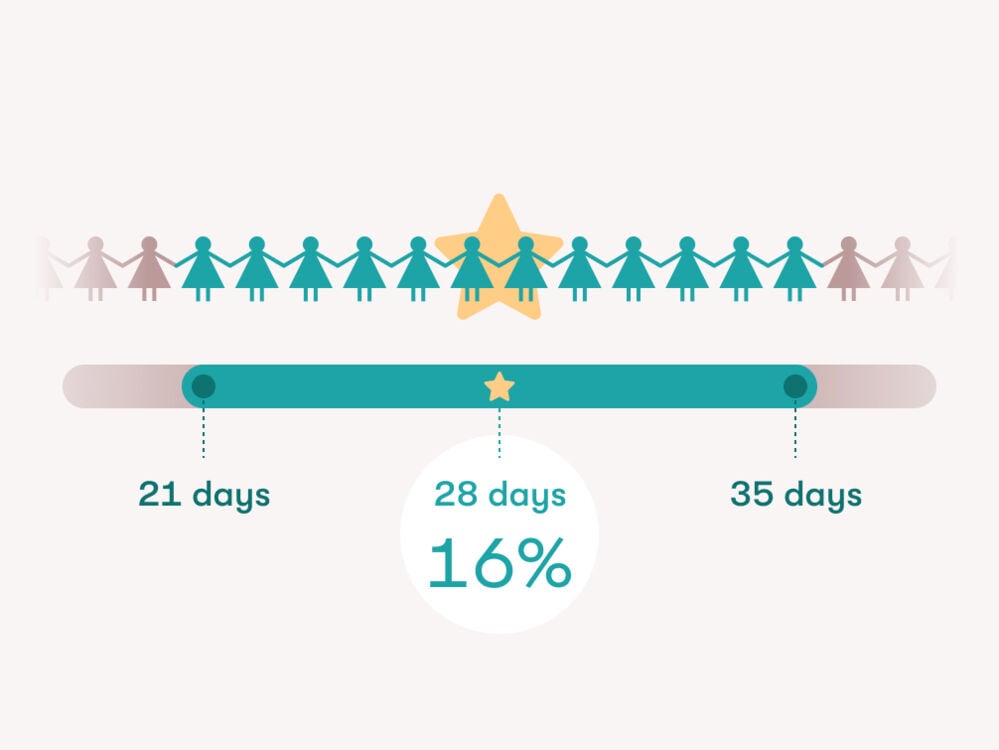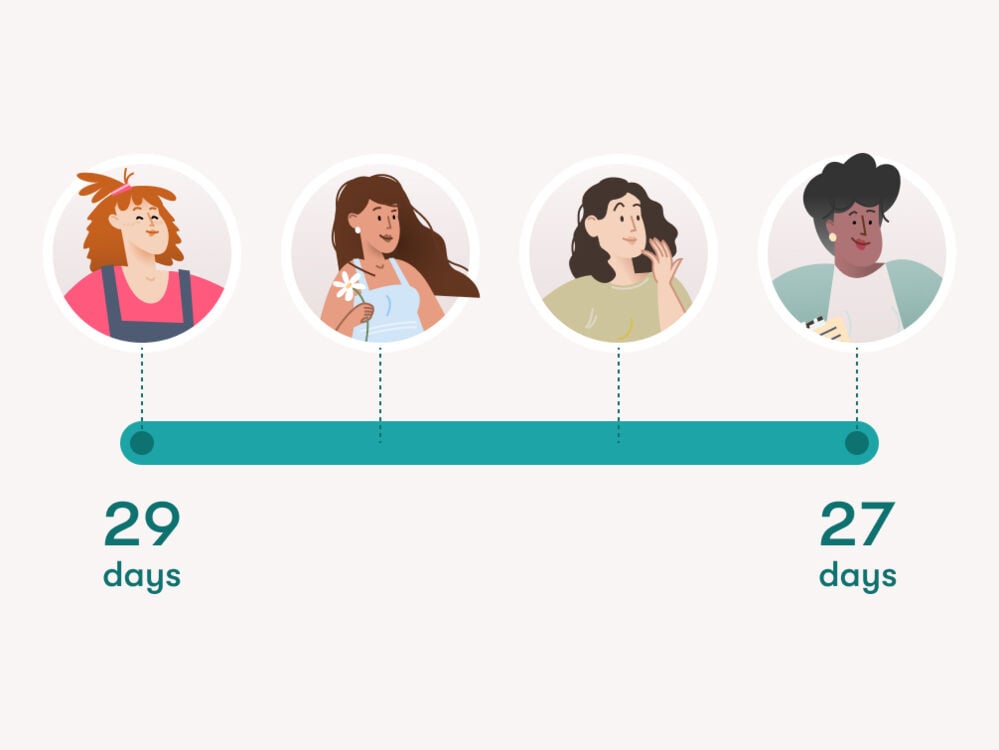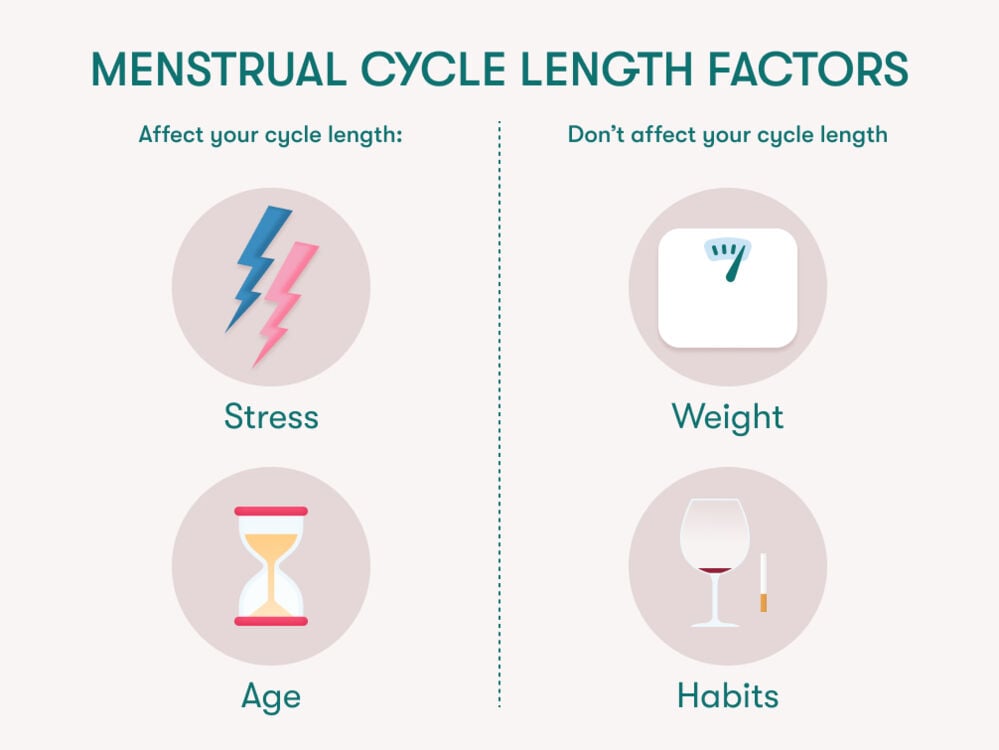Menstrual cycle length varies from person to person, but if yours has changed or become irregular, you might be wondering why. Here’s everything you need to know, including new research on whether age, stress levels, and lifestyle choices play a part
-
Tracking cycle
-
Getting pregnant
-
Pregnancy
-
Help Center
-
Flo for Partners
-
Anonymous Mode
-
Flo app reviews
-
Flo Premium New
-
Secret Chats New
-
Symptom Checker New
-
Your cycle
-
Health 360°
-
Getting pregnant
-
Pregnancy
-
Being a mom
-
LGBTQ+
-
Quizzes
-
Ovulation calculator
-
hCG calculator
-
Pregnancy test calculator
-
Menstrual cycle calculator
-
Period calculator
-
Implantation calculator
-
Pregnancy weeks to months calculator
-
Pregnancy due date calculator
-
IVF and FET due date calculator
-
Due date calculator by ultrasound
-
Medical Affairs
-
Science & Research
-
Pass It On Project New
-
Privacy Portal
-
Press Center
-
Flo Accuracy
-
Careers
-
Contact Us
Menstrual Cycle Length: Why Does It Change?


When it comes to menstrual cycle length, lots of us get confused about when our cycle begins and ends. So how do you calculate menstrual cycle length like a gynecologist?
The truth is, your menstrual cycle starts on the first day of one period and ends on the first day of the next period. The average menstrual cycle length is around 28 days, but this varies from person to person. Lots of things can affect the length of your cycle. For example, as you get older, your period may come sooner or later or get longer or shorter.
Your cycle can be as short as 21 days or as long as 35 days, and that’s totally healthy. But why do menstrual cycles vary, and what can cause a sudden change in your menstrual cycle length? Hormonal contraception, pregnancy, and menopause can all impact the length of your cycle, but what about your diet, the alcohol you drink, or your work/life balance?
Take a quiz
Find out what you can do with our Health Assistant
Over the last few decades, scientists have tried to work out what can cause menstrual cycles to fluctuate from month to month.
Research published in the Journal of Clinical Endocrinology and Metabolism looked at how hormonal changes brought on by menopause can impact the length of your cycle.
The study found that most of the women they questioned noticed their periods were getting shorter or longer around five years before they stopped entirely due to menopause. The average age when menopause occurs is 51.4, so this research would suggest menopause-related period changes start in our late 40s. However, it’s important to remember that the age you reach menopause is as individual as your cycle. That means you might experience these changes earlier or later than the average, or not at all.
Jessica Grieger and Robert Norman are researchers from Adelaide University. They noticed that a lot of the research on menstrual cycle changes has focused on the impact that physical and mental health can have on the cycle. They wanted to work out how lifestyle choices might lead to a change in cycle and ovulation patterns. So Grieger and Norman teamed up with Flo to explore how age, stress levels, and diet can impact your period.
They studied aggregated and anonymized data from 1.5 million Flo users around the globe who were 18+ years old. While looking at users’ cycle data as a whole, Grieger and Norman honed in on the lifestyle habits and patterns that users logged and how they may be impacting the duration of their cycles.
What is the average menstrual cycle length?

As mentioned above, it’s widely accepted that a 28-day menstrual cycle is the average. But there’s a difference between average and most common.
Grieger and Norman found that only 16 percent of the Flo users they studied had a period every 28 days. This highlights how difficult it can be to talk about the average menstrual cycle. Periods differ from person to person, and your cycle may change throughout your lifetime.
Since so few Flo users reported having a 28-day menstrual cycle, Grieger and Norman wanted to establish how lifestyle may impact menstrual cycle length.
Does your age affect your menstrual cycle length?

The first factor that Grieger and Norman wanted to explore was how age might impact the length of your menstrual cycle. So, they compared all age groups of Flo users.
Their analysis showed that, on average, people 40 and over had a menstrual cycle of around 27 days. And for users aged 18–24, 29-day cycles were typical. This would suggest that as we get older, our cycles get shorter.
Why? Well, your menstrual cycle is intrinsically linked to your hormone levels — and your hormone levels fluctuate and change throughout your life. For example, when you hit puberty and have your first period, you might notice that it’s particularly light or heavy. You might then skip a month or two or experience spotting throughout your cycle. All of this is healthy, especially as some people’s periods don’t regulate until a year or two after puberty begins.
Then, when you enter your 20s or 30s, your period may become more regular and your cycle more predictable. However, this isn’t always the case. Grieger and Norman found that young people reported more variations in their cycles than in other age groups.
Puberty isn’t the only hormonal change that comes with age that can have a big impact on your menstrual cycle. While many people will be aware of menopause — the milestone when a person hasn’t had a period for 12 months — the transition into menopause can take years. This phase is called perimenopause, and side effects such as hot flashes, night sweats, brain fog, and — you guessed it — changes in menstrual cycle length are common during this time.
On average, people experience menopause between the ages of 45 and 55. However, when you’re in your 30s and 40s, your ovaries begin to produce less estrogen. As your hormone levels change, your ovaries may not release an egg every cycle. This doesn’t mean that you’ve transitioned into menopause, but it can mean that both your periods and cycles may vary in length.
If you’re 35+ and trying to get pregnant, a period tracker app like Flo can be a useful tool for working out when you might be ovulating each month, especially if your cycle has become irregular.
Can weight affect menstrual cycle length?
While aging is an inevitable thing that we all experience, other lifestyle factors may also impact the length of your menstrual cycle.
A previous study into the impact that physical exercise can have on hormone levels noted that losing fat can cause estrogen levels to drop, which can prevent ovulation and may cause irregularities in your period. In some cases, it may stop altogether.
Grieger and Norman were keen to do their own research here. So they used body mass index (BMI) to identify any connections between weight and the menstrual cycles of Flo users. Your BMI is calculated by taking your weight in kilograms and dividing it by your height in meters squared.
In their study, Grieger and Norman found that BMI only has a small bearing on differences in people’s menstrual cycles. However, they did note that people with a higher BMI (35–50) had an average cycle length of 36 days or more. People with a BMI of 18.5–24.9 were more likely to have a cycle of around 21–35 days.
You may experience irregularities in your menstrual cycle, but Grieger and Norman concluded that BMI isn’t likely to be the cause.

Can stress levels impact your menstrual cycle length?
Because stress levels and mental health play such a key role in how you feel, Grieger and Norman wanted to establish if stress levels can impact the menstrual cycle. And in short, they absolutely can.
Past research published in the Journal of Clinical and Diagnostic Research found that people working in more demanding jobs experienced shorter menstrual cycles. Grieger and Norman’s study backed this up, confirming that if you experience high levels of stress (and also have a more sedentary lifestyle) then you’re more likely to have a shorter menstrual cycle. Similarly, people who said they experienced shorter menstrual cycles also reported higher levels of stress.
Think about what happens when you’re stressed — your body releases the hormone cortisol, which throws off the hypothalamus in the brain, which can prevent the release of hormones integral to regulating your cycle. It’s not surprising that your period might be affected.
If you’re worried about your stress levels, schedule an appointment to talk about it with your healthcare professional. They should be able to provide practical advice, including a referral for talking therapy with a counselor. Taking care of both your body and mind is important for your well-being.
Can smoking and alcohol affect menstrual cycle length?
While you might not link letting loose on the weekend with your period, past research published in the Fertility Research and Practice Journal has noted that heavy alcohol consumption can make it more difficult to get pregnant.
Grieger and Norman wanted to find out if smoking and drinking alcohol also impact the menstrual cycle length of Flo users. They were surprised to find that these lifestyle choices didn’t seem to cause irregular cycles or affect cycle length. However, they say that more research is needed before their findings can be considered conclusive.
What causes your menstrual cycle length to change: The takeaway
Grieger and Norman set out to establish how lifestyle factors like stress levels, BMI, and smoking and alcohol habits could impact menstrual cycle length.
While Grieger and Norman concluded that age and stress levels may have a direct impact on changes to period and menstrual cycle length, their study concluded that BMI and alcohol and smoking habits had less of an effect.
Another thing to keep in mind is that although the “average” menstrual cycle is 28 days long, only 16 percent of participants in their study reported a cycle of this length. Anything between 21 and 35 days is considered normal, as are slight fluctuations each month.
Remember: You know what’s normal for you, and you may notice that the length of your cycle changes as you get older, have children, or approach menopause. If you’re at all concerned, speak to your health care professional.


Hey, I'm Anique
I started using Flo app to track my period and ovulation because we wanted to have a baby.


The Flo app helped me learn about my body and spot ovulation signs during our conception journey.


I vividly
remember the day
that we switched
Flo into
Pregnancy Mode — it was
such a special
moment.
Real stories, real results
Learn how the Flo app became an amazing cheerleader for us on our conception journey.
References
Carroll, Haley A., et al. “The Relationship between Alcohol Consumption and Menstrual Cycle: A Review of the Literature.” Archives of Women’s Mental Health, vol. 18, no. 6, 2015, pp. 773–81. Crossref, doi:10.1007/s00737-015-0568-2. Accessed on Dec. 2.
Ennour-Idrissi, Kaoutar, et al. “Effect of Physical Activity on Sex Hormones in Women: A Systematic Review and Meta-Analysis of Randomized Controlled Trials.” Breast Cancer Research, vol. 17, no. 1, 2015. Crossref, doi:10.1186/s13058-015-0647-3. Accessed on Dec. 2.
Nagma, Shahida. “To Evaluate the Effect of Perceived Stress on Menstrual Function.” JOURNAL OF CLINICAL AND DIAGNOSTIC RESEARCH, 2015. Crossref, doi:10.7860/jcdr/2015/6906.5611. Accessed on Dec. 2.
NHS website. “Periods and Fertility in the Menstrual Cycle.” Nhs.Uk, 23 Nov. 2021, www.nhs.uk/conditions/periods/fertility-in-the-menstrual-cycle/#:%7E:text=The%20length%20of%20the%20menstrual,to%2040%20days%2C%20are%20normal. Accessed on Dec. 2.
“Onco-Fertility and Personalized Testing for Potential for Loss of Ovarian Reserve in Patients Undergoing Chemotherapy: Proposed next Steps for Development of Genetic Testing to Predict Changes in Ovarian Reserve.” Fertility Research and Practice, 30 June 2021, fertilityresearchandpractice.biomedcentral.com. Accessed on Dec. 2.
Ozimek, Noelle, et al. “Impact of Stress on Menstrual Cyclicity During the Covid-19 Pandemic: A Survey Study.” Journal of Women’s Health, 2021. Crossref, doi:10.1089/jwh.2021.0158. Accessed on Dec. 2.
Santoro, Nanette, et al. “Menstrual Cycle Hormone Changes in Women Traversing Menopause: Study of Women’s Health Across the Nation.” The Journal of Clinical Endocrinology & Metabolism, vol. 102, no. 7, 2017, pp. 2218–29. Crossref, doi:10.1210/jc.2016-4017. Accessed on Dec. 2.
“Can Stress Cause You to Skip a Period?” Cleveland Clinic, 29 Apr. 2021, health.clevelandclinic.org/can-stress-cause-you-to-skip-a-period. Accessed on Dec. 2.




